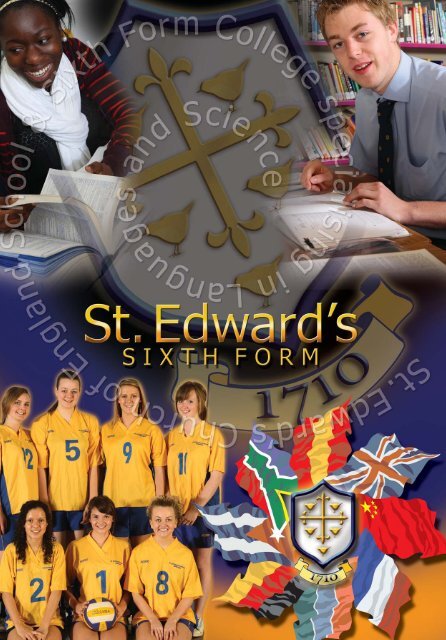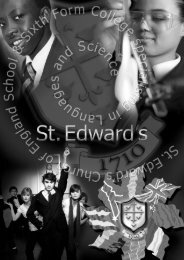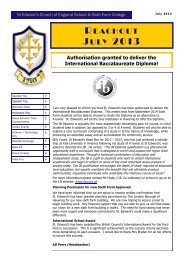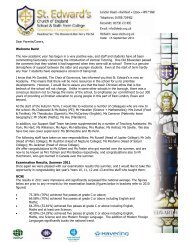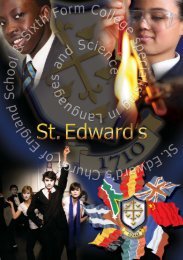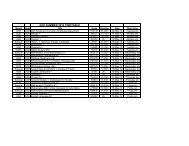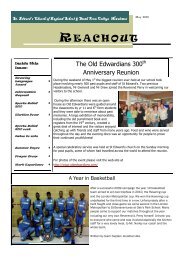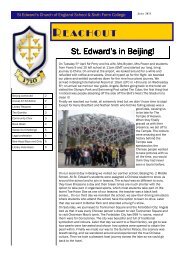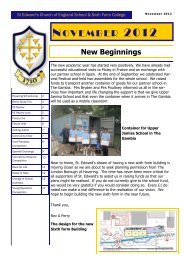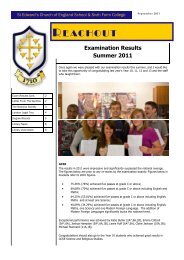St Edwards 6th 6xA4+ 09:Swan Valley 6xA4 - St Edward's C of E ...
St Edwards 6th 6xA4+ 09:Swan Valley 6xA4 - St Edward's C of E ...
St Edwards 6th 6xA4+ 09:Swan Valley 6xA4 - St Edward's C of E ...
- No tags were found...
You also want an ePaper? Increase the reach of your titles
YUMPU automatically turns print PDFs into web optimized ePapers that Google loves.
A welcome fromthe HeadteacherDear <strong>St</strong>udents,Welcome to <strong>St</strong> Edward’s Sixth Form College. <strong>St</strong>. Edward’sChurch <strong>of</strong> England School and Sixth Form College has along history and was founded in 1710 to educate the poorchildren <strong>of</strong> Romford. Since those days the school has gone fromstrength to strength and has provided a Christian educationfor young men and women from the age <strong>of</strong> 11 to 19. We prideourselves on <strong>of</strong>fering a traditional Christian ethos, alongside amodern and relevant curriculum, with a focus upon the careand nurture <strong>of</strong> each individual. Our staff are committed to thedevelopment <strong>of</strong> every student in their care and through a personalised curriculumand excellent teaching we seek to meet this goal.<strong>St</strong>. Edward’s is a specialist Language and Science College and is involved in local, national and international outreach. Most students lovestudying languages and Science and that is due to the enthusiasm and expertise <strong>of</strong> our staff. <strong>St</strong>. Edward’s has links with schools in manycountries and this includes, China, South Africa, The Gambia, Cuba and many European nations. For this work <strong>St</strong>. Edward’s was recognised bythe British Council and awarded the International School Award. <strong>St</strong>udents <strong>of</strong> our Sixth Form Collegeregularly raise money to support development projects abroad, especially during the annual Rag Week.<strong>St</strong>udents have been on expeditions run by The Fulcrum and World Challenge organisations. We are awell resourced Sixth Form College and continue to improve our facilities for the benefit <strong>of</strong> staff andstudents. <strong>St</strong>aff are engaged in continuous pr<strong>of</strong>essional development to constantly refine their craft,and students in the Sixth Form are encouraged to develop an active voice in the school.We have high expectations <strong>of</strong> our college students. They are expected to adhere to the college dresscode and act as role models for the younger students in the school. Whilst our students are very successful academically, and most go onto university, we regard the provision <strong>of</strong> broader educational opportunities as equally important. <strong>St</strong>udents are involved in many sportingactivities, musical ensembles, drama productions, an Amnesty Group and the Christian Union. At the heart <strong>of</strong> our provision is the partnershipbetween school, church and home – together we can provide the best for each student. I hope that you find this prospectus informativeand that it gives you some insight into what life is like at <strong>St</strong>. Edward’s Sixth Form College. Please contact me further if you would likemore information or would like to visit the college.With best wishes,The ReverendAlan PerryHeadteacher
A welcome from the Head <strong>of</strong> Sixth FormThe Sixth Form at <strong>St</strong>. Edward’s School is open to any student who is committed to their academic work and to playing an active andresponsible role in the life <strong>of</strong> the school. We aim to give opportunities for each student to grow in experience and wisdom.We provide a wide range <strong>of</strong> subjects at Advanced level, delivered by experienced and dedicated staff. We also will be delivering anumber <strong>of</strong> diplomas at Level 3 from 2010. Many <strong>of</strong> our students go onto university inspired by the enthusiasm and passion <strong>of</strong> theirteachers for their subject, and many return as teachers in the future. This is something for which <strong>St</strong>. Edward’s is very proud.There are challenges and responsibilities in Sixth Form life, which we believe will strengthen a sense <strong>of</strong> responsibility and increasedetermination to achieve personal ambitions. The time spent in our Sixth Form will prepare you for life afterwards, whether it will beat university or in employment.The Sixth Form should be an exciting time to enjoy and explore your favourite subjects, and to have the time to become involvedin projects that allow you to develop your self confidence and show initiative as you take your place amongst the senior students.We believe that <strong>St</strong>. Edward’s Sixth Form College fully embraces all these things.
The ethos <strong>of</strong> <strong>St</strong>.Edward’s Sixth Form CollegeThe Sixth Form here at <strong>St</strong>.<strong>Edwards</strong> is a community and a family. So whether you have been in the school since year 7 or whether youare thinking <strong>of</strong> joining the Sixth Form from another school, you will be equally welcomed.The Sixth Form has a strong tradition <strong>of</strong> giving a high level <strong>of</strong> support and guidance to all its students, although at the same timestudents are encouraged, in an environment where they are treated as adults, to take more responsibility for their own learning.Every student has a Personal Form Tutor who gives support throughout their time in the Sixth Form; whether it means helping withpersonal statements, job opportunities or gap year placements. Thus, in order to help students achieve their full potential, FormTutors regularly review students’ progress, targets are set and any necessary additional support is provided.Within the Sixth Form, teachers are always caring, passionate and committed to their students. This can be seen by the length <strong>of</strong> timemany have taught within the school, for instance some have been here for over 30 years and have even taught pupil’s parents as inmy case. This adds to the College’s wonderful and vibrant community spirit and means that all students are taught and encouragedin a friendly and caring environment.From my personal experience, I have benefitted both academically and socially from the Sixth Form, whether it be participating in theRag Week which raises money for local charities, helping with elderly social events or being chosen as part <strong>of</strong> the Fulcrum Challengewhich went to Tanzania this summer to help build a school for those who do not have anywhere near the same life chances as us.This truly reflects and represents the family we have at the Sixth Form – a community where all students are respected, supported,encouraged, cared for and inspired to believe in themselves and also in others.Dean Gillespie (Former Head Boy)
<strong>St</strong>udying the Sciences at <strong>St</strong>. Edward’s Sixth Form CollegeMy reasons for staying on at <strong>St</strong> Edward’s Sixth Form were that I wanted to stay within an environment that I was familiar with.After having spent five years at the school, I had some very special friends, who were also staying on. I was confident that the teachersalready knew my strengths and weaknesses which would enable me to settle into study at the next level much more quickly than if Ihad chosen an alternative Sixth Form. I chose to study A-Levels in Chemistry, Biology and Maths simply because I had enjoyed studyingthese at GCSE level and achieved good results. The three subjects complimented each other and were subjects that were probablygoing to lead me to the University degree I wanted to undertake.During my time in the Sixth Form I really enjoyed studying my chosen subjects. The classes were much smaller compared with GCSEclasses which allowed a much more informal approach to lessons, without making the lessons any less rigorous. I received lots <strong>of</strong>support and encouragement from my subject teachers to ensure I was working to the best <strong>of</strong> my ability. I was also given lots <strong>of</strong>advice from my Head <strong>of</strong> Sixth Form on what steps to take to further my education including taster courses at University or workexperience opportunities. I will be going on to read Medicine at university.Chloe Baulch (Former Head Girl)<strong>St</strong>udying the Arts at <strong>St</strong>. Edward’s Sixth Form CollegeI enjoyed these types <strong>of</strong> subjects enough for me to take English language and Literature at A level along with history. History ispersonally my favourite subject, and in two <strong>of</strong> my examinations I got 100% at AS!This was fundamentally due to the great class atmosphere and teaching in the school, by the teachers and the students. I now wishto study history at a university with a high sporting standard, with the ambition to become a teacher myself. The reason for wantingto go to university with an excellent Sporting tradition is because I am an athlete that is just shy <strong>of</strong> national expectations. Through theschool cross country I qualified at borough, county and national levels. If you are keen on Sport, <strong>St</strong>. Edward’s Sixth Form College willmeet your aspirations.Grant Twist (Former Head Boy)
Produced by FM Litho Design and Print. Tel: 01787 479479Church <strong>of</strong> EnglandSchool & Sixth Form CollegeSpecialising in Languages and ScienceLondon Road • RomfordEssex • RM7 9NXTelephone: 01708 730462Facsimile: 01708 731485Email: info@steds.org.ukWebsite: www.steds.org.uk
<strong>St</strong> Edward’s C <strong>of</strong> E School and Sixth Form CollegeCoursesAdvanced Level Courses(AS/A2) – one/two year coursesAS level – AS is short for Advanced Subsidiary. The ASis a qualification in its own right but it is also the first half<strong>of</strong> the A level course. The AS course usually consists <strong>of</strong>two assessment units.A2 level – The full A level qualification is made up <strong>of</strong>the AS units plus two more units at A2 which are studiesat a higher level.AccountingArtBiologyBusiness – Applied A levelBusiness <strong>St</strong>udiesChemistryClassical CivilisationEnglish LanguageEnglish LiteratureEthics and PhilosophyFood TechnologyFurther MathematicsGeographyGeneral <strong>St</strong>udiesGovernment & PoliticsGraphic Design – Product DesignHistoryIT – Applied A levelMFLMathematicsMedia <strong>St</strong>udiesMusicMusic TechnologyPsychologyPhysical EducationPhysicsRS – Christian <strong>St</strong>udiesSociologyTextiles – Product DesignTheatre <strong>St</strong>udiesDiplomasThe Diploma is a new qualification for 14-19 year olds.There are three levels <strong>of</strong> study: Foundation; Higher andAdvanced. From September 2010, <strong>St</strong> Edward’s Sixth FormCollege will be <strong>of</strong>fering Level 3 Diploma courses in Retail,Business Administration & Finance and Creative & Media.More details will be published in due course.General <strong>St</strong>udiesAll students in year 12 will follow a course leading to anAS qualification in General <strong>St</strong>udies.Intermediate level courses – one year courseOCR National level 2 Certificate in Business.1 year course equivalent to 4 GCSEs requirement is a4A* - D at GCSE.Entry requirements for<strong>St</strong> <strong>Edward's</strong> Sixth Form, 2010In order to be admitted to an A level course <strong>of</strong> study,it is necessary to have achieved the following at GCSE;• A minimum aggregate <strong>of</strong> 50 GCSE points based on asystem where A* = 8, A = 7, B = 6, C = 5, D = 4, etc.Short course GCSE exams will count for half these points,Double award GCSE exams will count for double.This should include at least grade C in English and Maths• A minimum <strong>of</strong> grade C in the subject chosen if youhave studied it at GCSE• For A levels in Maths or a Modern Foreign Language(French, German or Spanish) a minimum <strong>of</strong> grade Bat GCSE is required. For A levels in science a minimum<strong>of</strong> BB at GCSE is required• For admission to Psychology or Sociology you wouldneed to also have achieved a grade C in Science.For students who (for a legitimate reason) have taken areduced number <strong>of</strong> GCSE's, consideration will be givenby looking at the average GCSE points score across thesubjects taken.1
YOUR ROUTE TO THE SIXTH FORMTime ScaleOctober . . . . . . . . . OPTIONS EVENINGNovember . . . . . . . INTERIM REPORTHave youany questions?December . . . . . . . MOCK EXAMINATIONSFebruary . . . . . . . . APPLICATION FORMCOURSE CONSULTATIONSMay / June . . . . . . . GCSE EXAMSJuly . . . . . . . . . . . . INDUCTION COURSEDo you needCareers advice?Provisional<strong>of</strong>fers madeJuly/September . . . YOU JOIN ST EDWARD’S SIXTH FORM2
AccountingCourse outline:No prior knowledge <strong>of</strong> Accounting is required although aGCSE in Business <strong>St</strong>udies would be helpful.You will need to feel comfortable working with figures andshould have achieved at least a grade B in Maths at GCSE.You will:• Develop knowledge and understanding <strong>of</strong> theaccounting information system, accounting procedures,techniques and concepts; the role and limitations <strong>of</strong>accounting in decision making.• Be aware <strong>of</strong> the effects <strong>of</strong> economic, legal andtechnological change on accounting, and <strong>of</strong> thesocial implications <strong>of</strong> accounting decisions• Acquire a range <strong>of</strong> skills in decision making andproblem solving.• Understand the main features <strong>of</strong> published accounts<strong>of</strong> limited companies.• Be aware <strong>of</strong> the different structures <strong>of</strong> final accountsfor sole traders, partnerships, limited companies,manufacturing organisations and non-pr<strong>of</strong>itorganisations.• Develop an understanding <strong>of</strong> how accounting canprovide valuable information for measuring andmonitoring business performance, and for planningand decision makingAssessment:AS Level AccountingUnit 1: Introduction to Financial AccountingUnit 2: Financial and Management AccountingA2 Level AccountingUnit 3: Further Aspects <strong>of</strong> Financial AccountingUnit 4: Further Aspects <strong>of</strong> Management AccountingCareer Opportunities/Progression:• Follow a degree course in Accounting Economics,Business <strong>St</strong>udies, Politics or other Humanities.• Take an HND course in a Business/ Financerelated area• Take pr<strong>of</strong>essional qualifications in Accounting• Enter employment in accounting, banking andfinance, insurance, local government or businessrelated careersFor further information please contact Miss Metcalf.ArtCourse outline:A level Art and Design is a practical course which allowsstudents who have interest and aptitude in the subject t<strong>of</strong>urther their studies in art, craft and design.This art course <strong>of</strong>fers a range <strong>of</strong> opportunities for studentsto explore and experiment with a wide variety <strong>of</strong> materialsand processes and study the work <strong>of</strong> a variety <strong>of</strong> artists,craftspeople and cultures.You will study:2 units at AS and 2 units at A2:Unit 1: Exploration and discovery <strong>of</strong> new techniquesand media leading to a personal project relating to a settheme using your own choice <strong>of</strong> media.Unit 2 - Externally set Assignment from the Exam Board.Unit 3 – A Development <strong>of</strong> a personal project and extendedpersonal study relating to a set theme.Unit 4 - Externally set Assignment from the Exam BoardAssessment:All units are assessed and graded internally by the schooland a visiting moderator from the exam board.The full A level Qualification is made up <strong>of</strong> the AS unitsgrades plus the 2 units studied at the higher level.Career Opportunities/Progression:A Level art is valued by employers and higher education(universities and colleges).<strong>St</strong>udents who wish to further their studies in an art relatedfield can either apply by means <strong>of</strong> a portfolio interviewstraight to university for degree courses or choose thetraditional route <strong>of</strong> BTEC foundation in Art and Designat college or university.Careers that require an Art and Design qualification include:• Graphic Design• Illustration• Photography• Textile Design• Fashion Design• Interior Design• Computer Animation• Sculpting• Film Making• Art Restoration• Advertising• Video Art• Art Therapy• Automotive Design• Theatrical SceneryFor further information please contact Miss Cochlin.3
BiologyCourse outline:This course builds on some <strong>of</strong> the knowledge andunderstanding <strong>of</strong> GCSE Core and Additional Science or GCSEBiology. It is expected that students will have achieved agrade B or above in both Core and Additional Science.During the course, students will be expected to handleand interpret data. It would therefore be very helpful tohave achieved a GCSE grade B in Mathematics, althoughgrade C Mathematics will be considered.During the course, students will need to be able tocommunicate effectively, research information from avariety <strong>of</strong> sources, and think critically about problems.You will:• Develop greater understanding <strong>of</strong> biological factstogether with an appreciation <strong>of</strong> their significance innew and changing situations• Develop greater expertise in the area <strong>of</strong> practicalwork and the link between theory and experimentalwork• Continue to enjoy and further develop a personalinterest in the study <strong>of</strong> living organismsThe recognition <strong>of</strong> the responsible use <strong>of</strong> Biologyin society• Develop further the awareness <strong>of</strong> developments inBiology in the changing world into the new millenniumAssessment:AS levelUnit 1 Biology and diseaseUnit 2 The variety <strong>of</strong> lifeUnit 3 Investigative and practical skillsA levelThe full A level qualification is made up <strong>of</strong> the AS unitsplus three more units which are studied at a higher level.If you decide to take the second half <strong>of</strong> the course it willcover the three units described below:Unit 4 Populations and environmentUnit 5 Control in cells and in organisms.Career Opportunities/Progression:• Follow a degree course in Biology, EnvironmentalScience, Medicine, Nursing, Dentistry, Physiotherapy,Psychology or Pharmacy. This is just a small selection<strong>of</strong> the courses with direct links to Biology. It can alsobe used to support applications for Higher Educationcourses in non-scientific subjects• Employment in the area <strong>of</strong> the health pr<strong>of</strong>essions,e.g. biotechnology, catering and land managementFor further information please contact Mrs Jones.4Business - Applied A LevelCourse outline:What are Applied A LevelsThe GCE in Applied Business is ideal for candidates whodo not want to take a purely academic style GCE. It <strong>of</strong>fersa lot <strong>of</strong> choice which means it can be tailored to meet yourskills interests and ambitions. You get the best <strong>of</strong> bothworlds by gaining a respected GCE qualification thatencompasses a real world vocational approach.What entry qualifications will I needfor this course?You will need at least five GCSEs at grade C or above.A GCSE in Business <strong>St</strong>udies may be <strong>of</strong> benefit to you, butis not essential.Each Applied A level is made up <strong>of</strong> parts called units.These tell you what you need to learn, what evidence youhave to produce and what you need to do to get a , passfor the unit. There are two types <strong>of</strong> unit:• Mandatory units - units you must do.• Optional units. These will be decided by staff afterconsultation with students following the course.GCE Single AwardFive mandatory units and one optional unit; equivalent toone A levelAS Single AwardThree mandatory units; equivalent to one AS levelAssessment:The GCE in Applied Business provides a broad introductionto the subject and prepares you for study in further orhigher education., or further training for employment.Assessment is 33% externally tested and 67% by portfolioevidence( coursework).AS Mandatory unitsUnit 1: Creating a marketing proposal - portfolioUnit 2: Recruitment in the workplace - portfolioUnit 3: Understanding the business environment -externally assessedA2 Mandatory unitsUnit 9: <strong>St</strong>rategic decision making - externally assessedUnit 10: A business plan for the entrepreneurA2 Optional unitsUnit 11: Pr<strong>of</strong>iling and management stylesUnit 12: Launching a Business on-lineUnit 13: Promotion in actionUnit 14: Constructing a financial strategyUnit 15: Launching a new product or service in EuropeUnit 16: Training and developmentFor further information please contact Miss Metcalf.
Business <strong>St</strong>udiesCourse outline:The course provides a smooth transition from GCSE Business<strong>St</strong>udies to AS/A level, but GCSE Business <strong>St</strong>udies is notnecessary to take this subject at this level. At least a grade Cin Maths is necessary if students are to cope successfullywith the financial aspects <strong>of</strong> the course.You will:• Develop a critical understanding <strong>of</strong> organisations, themarkets they serve and the process <strong>of</strong> adding value• Consider the internal workings and management <strong>of</strong>organisations, in particular the process <strong>of</strong> decisionmakingin a dynamic external environment• Become aware that business behaviour can bestudied from the perspectives <strong>of</strong> a range <strong>of</strong>stakeholders including customers, managers,creditors, owners/shareholders and employees• Be aware <strong>of</strong> the economic, environmental, ethical,governmental, legal, social and technological issuesassociated with business activity• Acquire a range <strong>of</strong> skills, including decision makingand problem-solving in the light <strong>of</strong> evaluation and,where appropriate, the quantification and management<strong>of</strong> information• Be aware <strong>of</strong> the current structure <strong>of</strong> business andbusiness practice in different sectors and environments,including large and small organisations, manufacturingand service industries, local, regional, national andmultinational, pr<strong>of</strong>it and non pr<strong>of</strong>it-making entities• Be expected to use Information Technology throughoutthe course as a tool to aid understanding <strong>of</strong> thesubject contentAssessment:AS Business <strong>St</strong>udiesUnit 1: Planning and Financing a BusinessUnit 2: Managing a BusinessA2 Business <strong>St</strong>udiesUnit 3: <strong>St</strong>rategies for SuccessUnit 4: The Business Environment and Managing Change.Career Opportunities/Progression:• Take a degree course in Business <strong>St</strong>udies or anybusiness related area such as Administration, Finance,Human Resource Management or Marketing, (sometop Business courses require a high level <strong>of</strong>Mathematical ability so A level Maths would be anadvantage for high-aiming students)• Take an HND in any business area• Enter employment in any area <strong>of</strong> business• Take a degree in any non-business areaFor further information please contact Miss Metcalf.5ChemistryCourse outline:The qualification builds on the knowledge, understandingand process skills inherent in GCSE. It is expected thatyou will have achieved a GCSE Grade B in Chemistry orScience (both Core and Additional Science). During thecourse, students will be expected to handle and interpretdata, it would therefore be very helpful to have achieved aGCSE grade B in Mathematics, although grade C Mathematicswill be considered.The qualification integrates theory and relevant practicalwork, which are developed at different levels throughoutthe course. You will need to be able to communicateeffectively, research and think critically about chemicalproblems.You will:• <strong>St</strong>imulate and sustain your interest in, and enjoyment<strong>of</strong> chemistry• Gain greater knowledge and understanding <strong>of</strong>chemistry and to appreciate the inter-linking patternspresent in the subject• Show the relevant application and value <strong>of</strong> chemistryto society and how it may be used responsibly• Develop your skills in laboratory procedures andtechniques• Develop your ability to acquire knowledge by means<strong>of</strong> practical work• Provide opportunities for you to bring togetherknowledge <strong>of</strong> how different areas <strong>of</strong> chemistry relateto each otherAssessment:AS levelUnit 1: Foundation ChemistryUnit 2: Chemistry in ActionUnit 3: Investigative and Practical Skills in AS ChemistryA levelUnit 4: Kinetics, Equilibria and Organic ChemistryUnit 5: Energetics, Redox and Inorganic ChemistryUnit 6: Investigative and Practical Skills in A2 ChemistryCareer Opportunities/progression:• Follow a degree course in Chemistry, EnvironmentalScience, Medicine and Pharmacy. These are a smallselection <strong>of</strong> courses with direct links. UCAS handbooks will give you further guidance• Follow a Higher National programme in AppliedChemistry and related programmes, such as Sport<strong>St</strong>udies, Beauty Therapy, Applied Biology, Engineering,Agriculture, Animal Management, CountrysideManagement, Environmental Science, EquineManagement or Horticulture• Employment in the area <strong>of</strong> pharmacy andbiotechnology as possible examplesFor further information please contact Mrs Daniel.
Classical CivilisationCourse outline:There is no need to have studied any particular GCSE,although it would be expected that you would have atleast a C at GCSE English Language. You would need tobe interested in learning about the history and literature<strong>of</strong> the Ancient Greek and Roman worlds. The course doesnot require you to study Latin or Classical Greek.You will:Learn how to read and understand primary classicalsources and secondary sources. This will help you knowabout and appreciate the history, literature, culture andachievements <strong>of</strong> the Romans and the Greeks.You will develop your communication skills as youcommunicate your knowledge and understanding <strong>of</strong> thesubject in writing and speaking.Assessment:You will study 2 units for AS level:Unit 1: An introduction to an aspect <strong>of</strong> ClassicalCivilisation [Women in Athens and Rome]Unit 2: An introduction to an aspect <strong>of</strong> ClassicalCivilisation [Homer's Odyssey]and 2 units for A2 level:Unit 3: A study <strong>of</strong> an aspect <strong>of</strong> Classical Civilisation[Greek Tragedy]Unit 4: A study <strong>of</strong> an aspect <strong>of</strong> Classical Civilisation[Tiberius and Claudius]All four units are assessed by timed examination; there isno coursework.Career Opportunities/Progression:• Go to university to study Classical Civilization orAncient History• Take any Arts or Humanities degree with a deeperunderstanding <strong>of</strong> the roots <strong>of</strong> the subject• Be a better informed person who appreciates theorigin <strong>of</strong> many features <strong>of</strong> modern European lifeFor further information please contact Mr Bennett.English LanguageCourse outline:This course builds on some <strong>of</strong> the knowledge andunderstanding <strong>of</strong> GCSE English. It is expected that studentswill have achieved a grade C or above. It would help if youhave an active interest in language. <strong>St</strong>udents during thecourse will need to be able to communicate effectively,research information from a variety <strong>of</strong> sources and expressthemselves clearly and fluently in written form.You will study a wide range <strong>of</strong> topics such as how childrenacquire language, why and how language has changedand how issues such as gender, power and the growth incommunication technology affect language in use. You willalso develop an understanding <strong>of</strong> grammar and howlanguage works.You will:Learn to:• Select and apply a range <strong>of</strong> linguistic methods• Use appropriate terminology• Show critical understanding <strong>of</strong> a range <strong>of</strong> conceptsand issues relating to meaning in spoken and writtenlanguage using linguistic approaches• Analyse and evaluate the influence <strong>of</strong> contextualfactors in both written and spoken language• Show knowledge <strong>of</strong> the key parts <strong>of</strong> language• Demonstrate expertise and creativity in the use <strong>of</strong>English in a range <strong>of</strong> different contexts which showyour linguistic knowledgeAssessment:You will study 2 units for the AS level and 2 units for A level.There is a coursework module for one <strong>of</strong> the units in boththe AS and A level.The units will involve learning the following 6 subject areas:AS LevelUnit 1: Categorising textsUnit 2: Creating texts (coursework)A LevelUnit 3: Developing LanguageUnit 4: Investigating Language (coursework)Career Opportunities/Progression:• You could go on to study linguistics at university• Most courses at degree level• You could use this A level as pro<strong>of</strong> <strong>of</strong> your goodwritten communication skills• Media career• Use language more effectively both orally andin writing in any careerFor further information please contact Mr Delaney.6
English LiteratureCourse outline:This course builds on some <strong>of</strong> the knowledge andunderstanding <strong>of</strong> GCSE English Literature. It is expectedthat students will have achieved a grade C or above.<strong>St</strong>udents during the course will need to be able tocommunicate effectively, research information from avariety <strong>of</strong> sources and express themselves, giving clearopinions about texts supported with well-developed argument.You will read a range <strong>of</strong> prose, drama and poetry as wellas critical works.Success at A level is dependent on you sustaining a widerange <strong>of</strong> personal reading.You will:Learn to:• To articulate creative, informed and relevantresponses to literary texts, using appropriateterminology and concepts, and coherent, accuratewritten expression• To demonstrate a detailed critical understandingin analysing the ways in which structure, form andlanguage shape meanings in literary texts• To explore connections and comparisons betweendifferent literary texts, informed by interpretations<strong>of</strong> other readers• To demonstrate understanding <strong>of</strong> the significanceand influence <strong>of</strong> the contexts in which literary textsare written and receivedAssessment:You will study 2 units for the AS level and 2 units for Alevel. There is a coursework module for one <strong>of</strong> the unitsat both AS and A level:The units will involve studying the following:AS Level• Aspects <strong>of</strong> Narrative• Dramatic GenresA level• Texts and Genres• Further and independent readingCareer Opportunities/Progression:• <strong>St</strong>udy literature at university• <strong>St</strong>udy most courses at university• Show that you have the ability to develop a clearline <strong>of</strong> argument• Media careers• Teaching• It is a useful grounding for a career in Law• Pro<strong>of</strong> <strong>of</strong> good analytical, written and communicationskillsFor further information please contact Mr Delaney.7Ethics and PhilosophyCourse outline:A challenging thought provoking course. It is very usefulfor anyone considering a career in any <strong>of</strong> the caringpr<strong>of</strong>essions (Doctor, nurse, social welfare) or the world<strong>of</strong> business. It also has relevance to those who might beinvolved in any decision making situation. The course centresaround the Christian and secular or responses to moralissues alongside looking at Philosophical discussion.You will study:• Basic Philosophy looking at Classical Greek thought inPlato and Aristotle, their thoughts about body, soul,goodness, cause and purpose; the Judaeo Christianideas <strong>of</strong> God as creator, good and active in the world;Traditional arguments for the existence <strong>of</strong> God andchallenges to religious belief.• Ethical terms like good, bad, right and wrong;An introduction to various ethical theories. Situationand Virtue ethics, Natural Law. Thinking <strong>of</strong> ImmanuelKant, Utilitarianism, Religious ethics, absolute andrelative morality. Theses are applied to various contemporary moral problems; abortion, euthanasia;right to life; right to a child; genetic engineering andembryo research.• Alongside these two areas and in common withother subjects we will also be researching the requiredKey Skills.Assessment:AS level; AS is short for Advanced Subsidiary. The AS is aqualification in its own right but is also the first half <strong>of</strong> theA level course.G571: Philosophy <strong>of</strong> ReligionG572: Religious EthicsG581: Philosophy <strong>of</strong> ReligionG582: Religious EthicsCareer Opportunities/Progression:With a qualification in Religious <strong>St</strong>udies, you can go on tohigher education at College or University or seek employmentstraight away. The skills developed could be particularlyuseful ,for careers in law, education, social work, politics,medicine, business administration and the media.For further information please contact Mr Welsby.
Food TechnologyCourse outline:This course builds on some topics and practical skillscovered in both GCSE Food Technology and also Cateringexploring them in greater depth. A passion for workingand experimenting with food is essential.<strong>St</strong>udents must be able to work competently with food andhave mastered a good range <strong>of</strong> practical skills. <strong>St</strong>udents willneed to be creative and have a logical approach to work asthey will be required to research and investigate variousperspectives <strong>of</strong> the Food industry in the development andanalysis <strong>of</strong> food products.You will:• Develop an understanding <strong>of</strong> the physical properties<strong>of</strong> a broad range <strong>of</strong> ingredients and components [andtheir specific use in products]. Explore the processesand manufacturing techniques involved in producingfood products [including the use <strong>of</strong> CAD/CAM].• Manipulate, combine and compare food materialsand components as part <strong>of</strong> product development• Look at health and safety issues, consumer safetyand current legislation• Analyse food products in order to understand issuessuch as environmental sustainability <strong>of</strong> products,social factors, influences <strong>of</strong> cultureAssessment:AS level consists <strong>of</strong> 2 units:Unit 1: Materials, Components and ApplicationUnit 2: Learning through Designing and MakingAS level includes the results <strong>of</strong> AS level:Unit 3: Design and ManufactureUnit 4: Design and Making PracticeCareer Opportunities/Progression:• You could go on to follow a degree course in a Foodrelated study such as, Food Science, Public Healthand Nutrition, Consumer Trading <strong>St</strong>andards,Microbiology to name just a few.• There are many careers in the Food and DrinkIndustry in research, quality control, hygiene,packaging, food microbiology and food analysis.• From 20<strong>09</strong> Manufacturing Diplomas will beavailable in Food Product Design, Diet and HealthEducation, Food <strong>St</strong>udies and Food Marketing• You could follow an HND course for RetailManagement, Health, or DieteticsFor further information please contact Mrs Richards.8Further MathematicsCourse outline:You will be expected to have achieved at least a grade Ain your GCSE and will have studied the higher tier. Youwill also be studying Maths at AS levelYou will study:Further Mathematics AS and A level not only builds onwork you will have met at GCSE, and the work you will bedoing at AS level but also involves new ideas that are notcovered in any other part <strong>of</strong> the maths curriculum. At ASlevel you will study Further Pure 1 Numerical Methods,and Decision Maths 1. At A2 level there is an opportunityto study either Mechanics 2, Differential Equations orDecision 2 alongside Further Pure 2.Assessment:To qualify for the title ‘A’ level Further Mathematics studentsmust acquire six modules which must include Further PureMathematics 1 and 2. In order to get an AS you will needto take 3 units which must include Further PureMathematics 1.Other modules are <strong>of</strong>fered from Mechanics 2, DifferentialEquations, Decision Maths 1 and 2, and Numerical methods.Modules can be taken in June <strong>of</strong> Year 12 and <strong>of</strong> Year 13.Career Opportunities/Progression:AS Further Mathematics is very useful as a supportingsubject to many courses at A level and degree level,especially in the sciences, geography, psychology,sociology and medical courses.‘University engineering departments LOVE further maths’Dik Morling University <strong>of</strong> Westminster.A level Further Mathematics <strong>of</strong>ten has its’ grade inflated.There are also many areas <strong>of</strong> employment that see aMathematics A level as an important qualification and it is<strong>of</strong>ten a requirement for the vocational qualification relatedto these areas.Higher Education courses or careers that either require Alevel Further Mathematics or are strongly related include:• Engineering• Electronics• Maths• Computing• <strong>St</strong>atistics.For further information please contact Mr Thomas.
General <strong>St</strong>udiesCourse outline:All students in Year 12 at <strong>St</strong> Edward’s will follow a courseleading to an AS qualification in General <strong>St</strong>udies.You will:Develop your ability to have a greater awareness <strong>of</strong>human knowledge, understanding and behaviour andto appreciate that there are various ways <strong>of</strong> interpretingdifferent types <strong>of</strong> information. You will be able tocommunicate your knowledge and understanding <strong>of</strong> arange <strong>of</strong> issues and develop the ability to use evidenceand data to draw conclusions and formulate arguments.Assessment:AS is short for Advanced Subsidiary.It is a qualification in its own right.The AS consists <strong>of</strong> two assessment units:Unit 1: Aspects <strong>of</strong> Culture - Challenges for society.Unit 2: Scientific horizons - The individual in society.GeographyCourse outline:It is not a requirement that you should have studiedGeography at GCSE in order to take an AS level or A levelcourse in the subject. Several topics covered in the courseare developments <strong>of</strong> work covered at GCSE, but othersare new. What is more important is that you have a livelyand enquiring mind, an interest in the environment andcurrent affairs, a willingness to explore new ideas and anability to communicate your ideas effectively. Those studentswho studied GCSE Geography either as a full or shortcourse will find that the material and the skills they havelearned will prove a valuable foundation for further studiesat this level.You will:Learn about the relationship <strong>of</strong> human populations to eachother over space and time and their relationship with theirphysical environment at a variety <strong>of</strong> scales from the local tothe global. All units specified in AQA GCE Geography <strong>of</strong>feropportunities for you to consider:• Your own roles, values and attitudes in relation tothemes and issues being studied• The roles, values and attitudes <strong>of</strong> others includingdecision makers.As well as gaining a wide knowledge base about the worldand human integration with environments you will useand develop a broad range <strong>of</strong> skills from investigativeskills to applied ICT skills.Assessment:ASUnit 1: Physical and Human Geography (GEOG1)The core physical section:• Rivers, floods and managementThe core Human section:• Population changeOptional physical topics:• Cold environments• Coastal environments• Desert environmentsOptional Human topics:AS• Food supply issues• Energy issues• Health issuesUnit 2: Geographical Skills (GEOG 2)9
A levelA2Unit 3: Contemporary Geographical Issues (GEOG3)• Optional Physical topics: Plate tectonics andassociated hazards• Weather and climate and associated hazards• Ecosystems: Change and ChallengeOptional Human topics:• World cities• Development and globalisation• Contemporary conflicts and challengesA2Unit 4B: Geographical Issue Evaluation (GEOG4B)Career Opportunities/progression:• You will have access to a wide range <strong>of</strong> possiblecareer and higher education possibilities.• You will have learnt and used a variety <strong>of</strong> transferableskills throughout the course, for example collectingand analysing and interpreting data. These skills arein great demand by employers and universities andcan lead to a very wide range <strong>of</strong> employmentopportunities such as law, accounting andjournalism.For further information please contact Ms Tubridy.Government and PoliticsCourse outline:You do not need to have studied Government and Politicsor History at GCSE in order to take an AS or A level coursein the subject. It is more important that you should have alively and enquiring mind, an interest in politics and currentaffairs and a desire to explore new ideas. You must havereached GCSE grade C standard in English Language.You will study:• How to develop a critical awareness <strong>of</strong> the nature <strong>of</strong>politics and the relationship between political ideas,institutions and processes• What the structures <strong>of</strong> authority and power are withinthe political system <strong>of</strong> the United Kingdom, and howthese may differ from those <strong>of</strong> other political systems• What the rights and responsibilities <strong>of</strong> individuals are• How to develop personal effectiveness through acritical awareness <strong>of</strong> political events and issues, anunderstanding <strong>of</strong> the main political viewpoints andthe skills required to argue a case with relevanceand coherence• A clear understanding <strong>of</strong> the theories, motives andvalues that underpin governmental decision makingand the role <strong>of</strong> institutions in resolving conflicts andallocating scarce resources• In particular, you will learn about political institutionssuch as Parliament, the Prime Minister, the Cabinetand the judiciary. You will study political parties,pressure groups and political ideasAssessment:AS levelAS is short for Advanced Subsidiary.The AS is a qualification in its own right, but it is also thefirst half <strong>of</strong> the A level course. The AS course consists <strong>of</strong>two compulsory units.Module 1: People and politicsModule 2: Governing the United KingdomA levelThe full A level qualification is made up <strong>of</strong> the AS units plusthree more units which are studied at a higher level. If youdecide to take the second half <strong>of</strong> the course it will coverthe two units described below.Module 2: Representation in the USAModule 4: Governing the USACareer Opportunities/Progression:Government and Politics combines well with a range <strong>of</strong> othersubjects to lead to University courses in such areas as business,economics, law, media, philosophy and, <strong>of</strong> course, politics.For further information please contact Ms Davis.10
Graphic Design -Product DesignCourse outline:This course is suitable for anyone who has studied any <strong>of</strong>the following subjects or areas; Graphic Products, ResistantMaterials, Electronics, Food, Manufacturing, Built Environmentand Construction, Engineering and Product Design andhave achieved a C grade or better. It is possible to takethis course if you have not studied these subjects but youwill need a lot <strong>of</strong> determination and self motivation.It is recommended that candidates have attainedcommunication and literacy skills at a level equivalent toGCSE Grade C in English.You will:• Develop and sustain their creativity and innovativepractice• Recognise and overcome challenges• Develop a critical understanding <strong>of</strong> a variety <strong>of</strong> productsfrom a contemporary and historical perspective• Draw on a range <strong>of</strong> skills and knowledge from othersubject areas• Develop an understanding <strong>of</strong> contemporary designand technology practices• Use information and communications technology(lCT) and information handling skills to enhancetheir design and technological capability includingComputer Aided Design and Computer AidedManufactureAssessment:AS level - Year 12AS GCE is made <strong>of</strong> two mandatory units, which form50% <strong>of</strong> the corresponding four-unit Advanced GCE.Exam - F521: Advanced Innovation ChallengeCoursework - F522: The Product <strong>St</strong>udyA2 level - Year 13The Advanced GCE is made up <strong>of</strong> two mandatory unitsat AS and two further mandatory units at A2.Exam - F524: product DesignCoursework - Design, Make and Evaluate - portfolioCareer Opportunities/Progression:Advertising, Construction and Building Trades, GraphicDesign for magazines packaging etc, Engineering.Interior Design, Art, Illustration, Game Design, Architecture,Product Design, Fashion Design, Teaching, ExhibitionDesigners and many more.HistoryCourse outline:It is not a requirement that you have studied History atGCSE in order to take an AS or A Level course in the subject.A number <strong>of</strong> topics <strong>of</strong>fered for study are developmentsfrom GCSE but there are also plenty <strong>of</strong> topics <strong>of</strong>fered whichare likely to be new to most students. It is more importantthat you have an enquiring mind, an interest in the pastand its relevance to current affairs and an ability tocommunicate your ideas effectively. If you have not studiedHistory before, you must have reached grade C GCSEstandard in English Language.You will study:• About the significance <strong>of</strong> events, individuals, issuesand societies in history• How and why societies have changed over time.About the theories <strong>of</strong> historians and the languagethey use to discuss their ideas• To understand the nature <strong>of</strong> historical evidence andthe methods used by historians to analyse andevaluate it• To develop an understanding <strong>of</strong> how the past hasbeen interpreted and represented• To express your own historical ideas confidently andeffectively. This will include presenting ideas inseminars, in debates and discussions and in writingAssessment:AS is short for Advanced Subsidiary.Unit 1: Module 1- <strong>St</strong>alin's Russia 1924 - 1953Unit 1: Module 2 - Pursuing Life and Liberty:Equality in the USA, 1945-1968Unit 2: Henry VIII: Authority, Nation and ReligionA levelThe A level qualification is made up <strong>of</strong> the AS units plus 2more units which are studied at a higher level. If you decideto take the second half <strong>of</strong> the course it will cover the 2 unitsdescribed below:Unit 3: From Kaiser to Fuhrer: Germany 1900 - 1945Unit 4: Coursework: Crime and Punishments in Britain1830 - 1965Career Opportunities/Progression:History ASIA provides an excellent foundation for a number<strong>of</strong> popular careers including: journalism, law, civil service,personnel and most vocations in the business world.For further information please contact Ms Davis.For further information please contact Mrs Saville.11
ICT - Applied A LevelCourse outline:They are designed to <strong>of</strong>fer students an alternative, butequal qualification, to A levels with approximately 70%coursework.What entry qualifications will I needfor this course?You will need at least five GCSEs at grade C or above.Each Applied A level is made up <strong>of</strong> parts called units.These tell you what you need to learn, what evidence youhave to produce and what you need to do to get a passfor the unit. The units in the Applied A level in ICT are:You will study:Year 12• Using ICT to communicate - portfolio• How organisations use ICT – external• ICT solutions for individuals and society - portfolioYear 13• Working to a brief - external• Numeric modelling using spreadsheets - portfolio• Developing and creating websitesAssessment:The Applied GCE in ICT enables you to develop analyticalthinking and practical skills through investigating commercialand industrial information technology systems. It alsopromotes the skills required to use a range <strong>of</strong> s<strong>of</strong>twareapplications and covers areas such as systems analysisand the development <strong>of</strong> s<strong>of</strong>tware and databases. It also<strong>of</strong>fers students the opportunity to develop their skills inteam and project working.The course provides a sound basis for higher level studiesin computing and information technology as well as otherdegree courses.The units also prepare you for further training or employmentas computer users or in providing technical support forcomputer users. Examples <strong>of</strong> areas <strong>of</strong> employment includecomputer-aided design and manufacturing, publishing,multimedia presentations, database marketing,administration, accountancy, project managementand business planning.Career Opportunities/Progression:Each Applied GCE is related to a broad area <strong>of</strong> the world<strong>of</strong> work and is designed to allow a student to progress toa course in Higher Education or a responsible level <strong>of</strong>employment.For further information please contact Miss Metcalf.12MFL - French, Germanand SpanishCourse outline:We assume that most students will normally have achievedat least the equivalent <strong>of</strong> GCSE grade B, in the relevantlanguage before taking this course. It is essential to makeyour subject teacher aware as early as possible that youare considering continuing with a language to A Level andseek advice. You will need to feel confident at this level inthe four language skills <strong>of</strong> Listening, Reading, Writing andSpeaking. You must also have some knowledge andunderstanding <strong>of</strong> the culture and way <strong>of</strong> life <strong>of</strong> the targetlanguagecountry. You need to be interested in developingthis understanding and in exploring in much more depththe topic areas that you will have covered at GCSE.You will study:Reading: You will be able to read, understand andextract information from written passages in the targetlanguage that are taken from authentic sources, such asmagazines and newspapers, reports or books.Listening: You will be able to listen to, and understandcontemporary spoken language and answer questions onwhat you have heard. The passages that you will learn tolisten to will be taken from a range <strong>of</strong> sources such as newsreports on the radio or TV, weather forecasts, announcements,interviews and discussions.Speaking and Writing: You will learn how towrite essays or longer pieces and to hold conversations anddiscussions in the target language. You will learn all theappropriate grammar, words and phrases that will help you to:• Present information in the target language• Organise your arguments• Provide opinions• Analyse your ideasAssessment: AS levelThe AS is a qualification in its own right, but it is also thefirst half <strong>of</strong> the A level course. The AS course consists <strong>of</strong>three assessment units:Unit 1: Young People TodayUnit 2: People & SocietyA2 levelThe full A level qualification is made up <strong>of</strong> the AS unitsplus three more units which are studied at a higher level.Unit 3: Contemporary IssuesUnit 4: Yesterday, Today & TomorrowCareer Opportunities/Progression:Some students choose to do degree courses in languages;others choose to pursue a Higher Education course inanother subject, but choose a language option alongside it.Having a language at AS or A level will certainly improveyour employability, in particular in companies which haveinternational branches. Whether you are interested incontinuing your studies or working at home or abroad.For further information please contact Mr Fritsch.
MathematicsCourse outline:You will be expected to have achieved at least a gradeB in your GCSE. You will have studied the higher tier.You will study:AS and A level is a course worth studying in its own right.It is challenging but interesting. It builds on work you willhave met at GCSE, but also involves new ideas that some<strong>of</strong> the greatest minds <strong>of</strong> the millennium have produced.It serves as a very useful support for many otherqualifications as well as being a sought-after qualificationfor the workplace and courses in Higher Education.At AS level you will study Core 1 and 2 and <strong>St</strong>atistics 1.At A2 level there is an opportunity to study <strong>St</strong>atistics 2or Mechanics along side Core 3 and 4.Assessment:To qualify for the title ‘A’ level Mathematics students mustacquire six modules which must include Core Mathematics1, 2, 3 and 4. In order to get an AS you will need to take3 units which must include Core Mathematics 1 and 2.Other modules are <strong>of</strong>fered from <strong>St</strong>atistics 1 & 2 andMechanics 1 & 2.Modules can be taken in June <strong>of</strong> Year 12 and <strong>of</strong> Year 13.Career Opportunities/Progression:AS Mathematics is very useful as a supporting subjectto many courses at A level and degree level, especiallyin the sciences, geography, psychology, sociology andmedical courses.A level Mathematics is a much sought after qualificationfor entry to a wide variety <strong>of</strong> full-time courses in HigherEducation. There are also many areas <strong>of</strong> employment thatsee a Mathematics A level as an important qualificationand it is <strong>of</strong>ten a requirement for the vocational qualificationrelated to these areas.Higher Education courses or careers that either requireA level Mathematics or are strongly related include:• Economics• Medicine• Architecture• Engineering• Accountancy• Teaching• Psychology• Environmental <strong>St</strong>udies• Computing• InformationTechnologyMedia <strong>St</strong>udiesCourse outline:Media <strong>St</strong>udies is a vibrant, exciting and diverse coursethat will nourish students’ knowledge and understanding<strong>of</strong> a range <strong>of</strong> Media issues, skills and techniques across arange <strong>of</strong> Media; Film, television, radio, music, newspapers,magazines, Internet, computer games and advertising.4 A*-C grades at GCSE, including 2 in any <strong>of</strong> thefollowing subjects:• Media <strong>St</strong>udies• English• Art• ICT• Graphics• History• Business <strong>St</strong>udiesYou will:• Develop your interest and enjoyment in media textsand to become active readers• Examine the development <strong>of</strong> media institutions,their practices and output• Analyse the ways in which different media representthe world• Apply your knowledge and understanding aboutmedia issues and practices to your own practical work• Examine critically the ways in which media textshave been produced, circulated, consumed andinterpreted by audiences• Critically appraise the historical development andcurrent organisation <strong>of</strong> selected media institutions• Develop investigative and research skills and applythem to the analysis <strong>of</strong> media• Texts• Use your knowledge and understanding <strong>of</strong> differentmedia texts to explore comparisons and connectionsbetween themAssessment:This is by practical coursework and examination.Career Opportunities/Progression:Media; Film, television, radio, music, newspapers,magazines, Internet, computer games and advertising.For further information please contact Ms Murphy.For further information please contact Mr Thomas.13
MusicCourse outline:You should have obtained a grade C or higher at GCSE.Individual consideration will be given to those studentswho have not taken GCSE Music.You will study:The course demands performing, composing, listening andanalytical skills in almost equal measure. You will improveyour skills in performing and composing in a range <strong>of</strong> styles.You will listen to a wide variety <strong>of</strong> music and develop amore informed appreciation <strong>of</strong> how and why it was writtenand/or performed.Assessment:It is made up <strong>of</strong> 3 units, which are then extended at A2 level:Unit 1: Performing (30% <strong>of</strong> AS)Unit 2: Composing (30% <strong>of</strong> AS)Unit 3: Developing Musical Understanding (30% <strong>of</strong> AS)This course is suited to enthusiastic musicians, who arekeen to strengthen their knowledge and explore new ideas.You need to be <strong>of</strong> at least a grade 5 standard by the April<strong>of</strong> your AS year, although you do not have to have takenany grade exams. You should also have gained a B gradeor higher at GCSE.A2The A2 Music course is made up <strong>of</strong> 3 units:Unit 4: Extended Performance (30% <strong>of</strong> A2)Unit 5: Composition and Technical <strong>St</strong>udy (30% <strong>of</strong> A2)Unit 6: Further Musical Understanding (40% <strong>of</strong> A2)The A2 Music course enables students to extend the skills,knowledge and understanding gained through the AS Musiccourse. You need to be <strong>of</strong> at least a grade 6 standard bythe April <strong>of</strong> your A2 year, although you do not have to havetaken any grade exams.Career Opportunities/Progression:This AS/A level in Music can lead to further study inMusic or Performing Arts in Higher Education at degreeor HND level. Music can be used as part <strong>of</strong> your course tobroaden your studies and may lead on to a career in themusic industry.For further information please contact Mrs Yeomans.14
Music TechnologyCourse outline:Ideally, students have obtained at least a grade C in Musicat GCSE, but individual consideration will be given to thosewho did not take Music at GCSE level.You will:• Produce performances using sequencing s<strong>of</strong>twarein a range <strong>of</strong> musical styles• Develop the skills required to make high qualityrecordings <strong>of</strong> musical performances• Learn how to compose and arrange using technology• Develop your knowledge <strong>of</strong> the principles anddevelopment <strong>of</strong> music technology• Learn how to control and interpret dataAssessment:This course is designed to develop your knowledge <strong>of</strong>music technology s<strong>of</strong>tware such as Cubase and Sibelius,as well as teaching you the rudiments <strong>of</strong> the recordingstudio, and how to produce live recordings.Unit 1: Music Technology Portfolio 1 - (70% <strong>of</strong> AS).Unit 2: Listening and Analysing - (30% <strong>of</strong> AS).This course is suited to students who are interested inlearning about recording, sequencing and the development<strong>of</strong> music technology and its applications. <strong>St</strong>udentsshould be pr<strong>of</strong>icient in at least one instrument, and shouldbe able to read music. GCSE music is preferred, thoughnot essential, but students should be able to prove thatthey are competent musicians before they will be acceptedonto the course.A2Unit 3: Music Technology Portfolio 2 - (60% <strong>of</strong> A2)Unit 4: Analysing and Producing - (40% <strong>of</strong> A2)Unit 3 builds on skills acquired in Unit 1.Tasks are extended to include a composition and involvesdetailed study <strong>of</strong> The Development <strong>of</strong> Music Technology.In addition to three coursework tasks, students alsoundertake a 2 hour written examination to assess musicalunderstanding and a practical test to measure ability toproduce a balanced stereo mix.Career Opportunities/Progression:• Further study <strong>of</strong> music technology• Performing arts at Higher National or degree level• Career in the music industry or technology/computer orientated careerPsychologyCourse outline:You do not need to have studied Psychology at GCSE inorder to take an AS or A level course in the subject. It ismore important that you should have a lively and enquiringmind, an interest in human behaviour and experience anda desire to explore new ideas.You will study:There are 6 AS modules which include:Module 1: Cognitive Psychology (Memory)Module 2: Developmental Psychology(Attachment theories)Module 3: Research Methods in PsychologyModule 4: Biological Psychology (<strong>St</strong>ress)Module 5: Social Psychology (Social Influence)Module 6: Individual Differences (Abnormal psychology)The A2 course will include:• A study <strong>of</strong> one type <strong>of</strong> Psychopathology such asSchizophrenia• A study <strong>of</strong> one contemporary issue withinPsychology such as Addictive behaviour• Psychological research and scientific method• The course will also include study on some <strong>of</strong> thefollowing:Biological rhythms and sleep;Perception;Relationships;Aggression;Eating disorders;Development.Assessment:AS will comprise <strong>of</strong> two 1.5 hour examsA2 will comprise <strong>of</strong> one 1.5 and one 2 hour exam.There is no coursework for this subject.Informal assessment is continuous throughout AS and A2by regular marked assignments set by the course teacherCareer Opportunities/Progression:• AS and A level Psychology give students a uniqueunderstanding <strong>of</strong> why people behave in a certainway and what causes human behaviour.• This course is extremely beneficial for careers inhealth, welfare, medicine, law, teaching, marketing,human sources, general management, the policeand the media.• A level Psychology is an excellent foundation forfurther study in this subject or related subjects inhigher education.For further information please contact Mrs Yeomans.For further information please contact Ms Daniels.15
Physical EducationCourse outline:This course builds on some <strong>of</strong> the topics covered in theGCSE Physical Edu cation course, exploring them in greaterdepth. It is expected that you will be a keen, and ablesportsperson who regularly participates in competitive sportoutside <strong>of</strong> school. You will also require an interest in PhysicalEducation and sport as a whole. You must be prepared tolearn both independently as well as in groups when indicated.You must be able to communicate your ideas effectivelyand be able to present to peers and teacher alike.You will:• Develop knowledge and skills in selected sporting activities• Explore the contemporary sociological issuesin modern sport• Examine the effects <strong>of</strong> exercise and therelationship between training and performance• Analyse how sportspeople learn to be skilful• Compare and contrast the role <strong>of</strong> sport indifferent cultures• Explore the historical background <strong>of</strong> sport andPE in this countryAssessment:You will study four units for the AS level.Unit 1: Anatomy and PhysiologyUnit 2: Movement SkillsUnit 3: Contemporary <strong>St</strong>udiesUnit 4: Performance and Critical AnalysisYou will study a further three units for A2 level.Unit 5: Exercise and Sport PhysiologyAnd two options from the following:Unit 6: Historical <strong>St</strong>udiesUnit 7: Comparative <strong>St</strong>udiesUnit 8: Psychology <strong>of</strong> Sport PerformanceCareer Opportunities/Progression:Physical Education/Sports Science is one <strong>of</strong> the mostpopular subjects at university.This course could lead to opportunities in:• Degree level Physical Education and Sports Science• Careers such as physiotherapy, physiology, sportscoaching and sports journalism• A variety <strong>of</strong> employment opportunities such asrecreational management, sports and leisureservices and the Civil Service [exercise and fitness,coaching, sports development and the outdoors]BTEC: Also planned for 2010 is the BTEC National in Sport.A qualification designed to provide a specialist work-relatedqualification in a range <strong>of</strong> sectors, giving learners theknowledge, understanding and skills they need to preparethem for employment.For further information please contact Miss Campbell.PhysicsCourse outline:The qualification builds on the knowledge, understanding andprocess skills that you will have developed in GCSE Science.<strong>St</strong>udents are expected to have achieved at least a GCSE GradeB in Physics or BB in Science (Core and Additional Science).It will be very helpful to have at least a grade B in Mathematics,although grade C Mathematics will be considered, as numeracyand mathematical skills are important in Physics. Communicationis also important in Physics so you will need to be able tocommunicate effectively, be able to research and critically thinkabout problems. You will learn theory and develop relevantpractical skills throughout the course.You will study:• Sustain and develop your enjoyment <strong>of</strong>, and interestin, physics• Develop essential knowledge and understandingin physics• Develop the skills needed for the use <strong>of</strong> thisknowledge and understanding in new and changingsituations where appropriate• Develop an understanding <strong>of</strong> the link betweentheory and experiment• Appreciate how physics has developed and is usedin present day society• Show how physics links with social, philosophical,economic, industrial and environmental matters• Recognise the quantitative nature <strong>of</strong> physics• Understand how mathematical expressions relate tophysical principles• Bring together knowledge <strong>of</strong> ways in which differentareas <strong>of</strong> physics relate to each other• <strong>St</strong>udy how scientific models describe the world around usAssessment:ASUnit 1: Particles, Quantum Phenomena and ElectricityUnit 2: mechanics, Materials and wavesUnit 3: Investigative and practical skillsA2Unit 4: Fields and further PhysicsUnit 5: Nuclear Physics, Thermal Physics and a topicUnit 6: Investigative and Practical Skills at A2Career Opportunities/Progression:Use Physics to support other qualifications or progressonto further studies or employment• This can range from a Higher National programme(HNC & HND) to degree level• In courses ranging from Physics, the Sciences,Medicine to Engineering• In Chemical Engineering and related programmes• In employment in the area <strong>of</strong> radiography, andbiotechnology as possible examplesFor further information please contact Mr Guttridge.16
RS - Christian <strong>St</strong>udiesCourse outline:Welcome to the world <strong>of</strong> AS/A level Religious <strong>St</strong>udies.This course gives you an opportunity to study some <strong>of</strong> thefundamental questions which people have always askedabout life. Why are we here? How should we behave?What happens to us when we die? The courses have beenbased on what was previously provided and reworked into amodular format. It is a format we have been teaching herefor a number <strong>of</strong> years very successfully.You will:• Develop an interest and enthusiasm for a rigorousstudy <strong>of</strong> Christianity• Treat the subject as an academic discipline bydeveloping your knowledge and understandingappropriate to a specialist study• Make use <strong>of</strong> enquiring critical empathetic approachwithin that studyAssessment:ASAS is short for Advanced subsidiary. The AS is a qualificationin its own right but is also the first half <strong>of</strong> the A level course.The AS course consists <strong>of</strong> 3 assessed units:Unit 1: FoundationUnit 2: GospelsUnit 3: Development in Christian thoughtA levelThe full A level qualification is made up <strong>of</strong> the two mainAS units studied at a deeper level, with a unit which looksat the links between the areas <strong>of</strong> study.Unit 4: GospelsUnit 5: Development in Christian thoughtUnit 6: The links between the two areas <strong>of</strong> studyCareer Opportunities/Progression:With a qualification in Religious <strong>St</strong>udies, you can goon to higher education, at College or University or seekemployment straight away. The skills developed could beparticularly useful for careers in law, education, social work,politics, medicine, business administration and the media.SociologyCourse outline:You will need to have achieved a broad base in yourGCSE exams, including a minimum <strong>of</strong> grade C in English,Mathematics and Science.You will study:AS level Modules are:Unit 1: Families and HouseholdsUnit 2: Education and Sociological MethodsAS can be awarded as a discrete qualification or count as50% <strong>of</strong> a full A level.A2 level Modules are:Unit 3: Mass mediaUnit 4: Crime and DevianceAssessment:ASTwo written examinationsA2:Two written examinationsInformal assessment is continuous throughout AS and A2courses by regular marked exam question assignmentsset by the tutor.Career Opportunities/Progression:• The course develops students' analytical andinvestigative skills as they question the beliefs andperceptions surrounding them.• Sociology is extremely useful in contemporary life inunderstanding why things are as they are; it is alsoan advantage for students pursuing careers in socialwork, health and welfare, medicine, law, teaching,the police and the media.• A level Sociology lays a good foundation for futurestudies in this subject and related subjectsFor further information please contact Miss Wanambwa.For further information please contact Mr Welsby.17
Textiles [Product Design]Course outline:This course builds on some topics and practical skills coveredin GCSE Textiles Technology exploring them in greater depth.<strong>St</strong>udents need to be confident in using a sewing machineand have a desire to experiment with techniques to achievea final product.<strong>St</strong>udents will need to be creative and have a logicalapproach to work.You will:• Work with a variety <strong>of</strong> textiles, materials andcomponents in order to understand their workingcharacteristics and physical properties• Explore the processes and manufacturing techniquesinvolved in producing textile products [and explorethe major developments <strong>of</strong> design through thenineteenth and twentieth centuries and thecontributions they have made to style and fashion.]• Work in two and three dimensional forms, developingdesign ideas.• Look at new technologies within the textile field andtheir influence on design• Gain an understanding <strong>of</strong> the different stagesinvolved in production including the roles <strong>of</strong>pr<strong>of</strong>essionals within the industry.• Have the opportunity to critically appraise productsin order to influence their own designing and making.Assessment:AS level consists <strong>of</strong> 2 units - each unit is 50% <strong>of</strong> thetotal AS mark.Unit 1: Materials, Components and ApplicationUnit 2: Learning through Designing and MakingA2 level includes the results <strong>of</strong> AS level.Unit 3: Design and ManufactureUnit 4: Design and Making PracticeCareer Opportunities/Progression:• You could go on to follow a degree course in aTextile related study such as Fashion and Textiles,Interior Design, Surface Design, Fashion Promotion,Textile Art, Design and Technology, TextileManagement. These are only a few <strong>of</strong> the courseson <strong>of</strong>fer in this field.• You could go on to follow a course in HNC Fashion,or a foundation degree in an Art related subject.• There are also a number <strong>of</strong> opportunities in thebuying side <strong>of</strong> the retail industryTheatre <strong>St</strong>udiesCourse outline:It is useful to have taken Drama at GCSE but not essential.It is important that you are interested in gaining a greaterunderstanding <strong>of</strong> how theatre and plays work and that youare keen to be involved in practical work as both actorand director.It is essential that you have at least C grades in bothEnglish GCSEs before you start the course.You will study:The course demands practical, creative and communicationskills in almost equal measure. You will extend your ability tocreate theatre in performance. You will also be required towrite about theatre and to develop your powers <strong>of</strong> analysisto be an informed critic. The course will involve creatingyour own piece <strong>of</strong> theatre as well as studying plays,playwrights and theatre practitioners through practicaland written work.Assessment:AS levelUnit 1: Live Theatre Production Seen and Prescribed PlaySection A - response to live theatre seen during the course.Section B - study <strong>of</strong> one set play from a choice from six plays.Unit 2: Presentation <strong>of</strong> an Extract from a PlayPerformance by a group <strong>of</strong> an extract from a published play.The assessment also includes candidates' preparatory anddevelopment work and supporting notes.A2 levelUnit 3: Further Prescribed Plays including Pre - 20th CenturySection A - pre-twentieth century plays andSection B - twentieth century or contemporary plays.Section B is synoptic, requiring suggestions for a complete stagerealisation <strong>of</strong> a short extract from the play printed in the paper.Unit 4: Presentation <strong>of</strong> Devised DramaPerformance by a group <strong>of</strong> devised drama. The assessment alsoincludes candidates' preparatory and development work andsupporting notes.Career Opportunities/Progression:• Education at degree or HND level. It can be used aspart <strong>of</strong> your course to broaden your studies and maylead on to a career in the performing arts industries.• Theatre <strong>St</strong>udies AS/A level complements a range<strong>of</strong> subjects and is useful in building confidence andimproving presentation skills in a range <strong>of</strong> careersFor further information please contact Miss Howson.For further information please contact Mrs Richards.18


